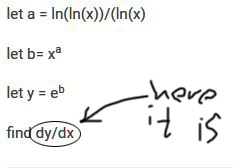-
Posts
6975 -
Joined
-
Last visited
-
Days Won
66
Content Type
Profiles
Forums
Events
Gallery
Blogs
Everything posted by bonanova
-
Looks like ...
-
That was the first-cut answer in the ant-chessboard problem. The solution is easier to find if we (reasonably) assume that
-

Senseless promotions? Or, the wisdom of the tea people
bonanova replied to bonanova's question in New Logic/Math Puzzles
I'm humbled. btw I sharpened (with humor) the flavor text and posted this on another favorite site. It will be interesting to see how quickly it's solved there. -

Senseless promotions? Or, the wisdom of the tea people
bonanova replied to bonanova's question in New Logic/Math Puzzles
@Molly Mae gets the coveted bonanova gold star for finding an algorithm and getting the answer in less than one day. So now that the cat (algorithm) is out of the bag, so to speak, it should be trivial to find whether an integer can triple, (or quadruple, or quintuple) under the same manipulation. It's also interesting that his solution forms a ring that shows the doubling process also occurs for four other ending digits (not 1, so his is the smallest.) But which ones? Incidentally, this also shows that all such integers have 18 digits. -
Fun one.
-

Senseless promotions? Or, the wisdom of the tea people
bonanova posted a question in New Logic/Math Puzzles
Things are not going well at the Acme Company. Executive talent is hard to come by, and it is not cheap. Folks at the water cooler have no ideas, and the coffee-breakers can't imagine how to improve things either. But those who party around the teapot, they came up with something. They suggested to the Board that Acme promote the newest hire in the mail room and make him the CEO! We need to shake things up, but good. Qualifications, job experience, brains, judgment, integrity, these are all things of the past. Some were not so sure. Doesn't make sense at all, the old timers said. Almost like appointing some guy with orange complexion to be President. That's exactly the idea, said the tea-people. Turn things on end, let the bull loose in the china shop, and see what happens. Hey -- how could it be worse than what we have now? Not surprisingly, the debate was long and heated. Such a risk merited proof of possible gain, so the old guard posed a challenge: produce a concrete example of where the idea had been tried with incontrovertible benefit. In fact, make it mathematical. You know, something that might make a good BrainDen puzzle. We'll promote the mail room guy, they said, if you can show us an integer that doubles in value when its least significant digit is promoted to its most-significant position. That is, give us a number { some digits } q that has half the value of q { same digits }. That all happened last week, and now we're looking for the mail room guy. Was he promoted? Did the tea people find such a number? Is there one? We need a number or a proof that one does not exist. T.L.D.R. What number doubles in value by by moving its last digit to the first position (if there is one)? -
Al, Bert and Charlie are on the ballot for secretary of the local yacht club, and they finish in a three-way tie. To break it, they solicit the members' second choices, and again it's a three-way tie. Al notes that since the number of members is odd, a series of two-way votes would be decisive. As a reward for finding a way past the impasse, Al receives the bye and will take on the winner of a Bert vs Charlie vote to decide who gets the position as secretary. Assuming voter preferences do not change, what are the winning probabilities for the three gentlemen?
-
Alternate approach to the ant-checkerboard problem asks: What is the probability of flipping 8 heads before 5 tails?
-
If we place four matches in the form of a square, they form 4 right angles. If we place them like a hash-tag (#) they form 16 right angles. If someone removes one match, can we still form 12 right angles? (No bending or breaking of the matches is allowed.)
-
The answer probably does change with the nature of the distances.
-
Regarding the 5 probabilities after 12 ant moves:
-
Case by case results, inviting algorithm falsification, while limiting lengths to 10.
-
-
Naively.I might want the first n-1 coins to be heads if the valuable one was tails in the nth position. I'd have you keep flipping them until they showed heads. But /// I watched the video, so ... nah.
-
I can ask you to flip a coin for a 2nd time?
-
@Pickett It may not impact your solution, but the OP did not intend to say that all of us drank something. "Class of drinkers" was not meant to preclude anyone from drinking nothing. Meaning there are eight "classes" of drinkers. Sorry for that. I have this thing about insisting that zero is a number, rather than a denial. Also, I get a different answer. I'll check my analysis against yours to see why.
-
It means that all of the teetotalers drank neither wine nor beer. Let's say also that the others did consume alcohol. One class of friends may have drunk nothing, and perforce not used a glass.
-
Thinking. Meantime I'll call your 10 minutes of cat flight and raise you 25 minutes of Roomfull of Teeth, as they explore new uses for the human voice, which you might actually enjoy.
-
A bunch of friends went to the sports bar and got a group rate on the drinks: $5/glass for wine, $2/glass for beer, and $1/glass for water. When we left, the waiter asked me to sort out the bill. There was enough uncertainty in what people remembered that I could not be precise. So we happily just threw in enough to cover the bill, which came to $293 and we went home. But it got me thinking. None of us had multiple glasses of the same beverage. The waiter said 106 glasses were used, once each. 18 of us did not drink water. 39 people had wine. I was certain that 9 of us were teetotalers. If I had known the sizes of just three classes of drinkers I could have figured out the bill, as it was, I could not. But it did occur to me that if those who drank beer and water but not wine were as many as possible, and if those who drank only wine were half as many as that, I could say the smallest number of us who drank all three. Can you?
-
Let there be n red cards and n black cards.
-
I just re-read this, and my reply wasn't totally responsive. But let's see whether Charlie even makes us address this question. Remember, Charlie doesn't get any more coins to deal with than Albert did. If we believe Albert's box (can) get emptied, we can't say discarding Charlie's coins is an impossible task. We simply have to show that none of Charlie's coins is able to "hide" indefinitely, in hopes of hearing the clock strike while still being in the box. Charlie's coins are not inscribed, so we have to treat them collectively. We can't trace the destiny of any individual coin, as we could in Albert's case. Can we still show they are all eventually discarded, and not face the task of depleting an infinite set along the way? We claim that we can do that. We can refer to each of Charlie's coins as "one of the coins that entered Charlie's box at event n that was also not discarded at event n." The n coins in his box at any such time are indistinguishably equivalent. Their "fate" is countably infinite events with non-zero probability of being discarded. We have shown in a preceding post that each of Charlie's coins has a survival probability of k/n where k is the event when the coin entered his box and n is the current event number. k is fixed. n becomes infinite. The probability of the coin that entered Charlie's box at event k still being in his box after midnight is limit (n->inf) k/n = 0. Since this holds for each k it holds for each coin that entered Charlie's box. Using other words, every coin that is in Charlie's box at midnight is not a coin that entered Charlie's box. A contradiction. Also, at no event time did Charlie have an infinite number of coins.

